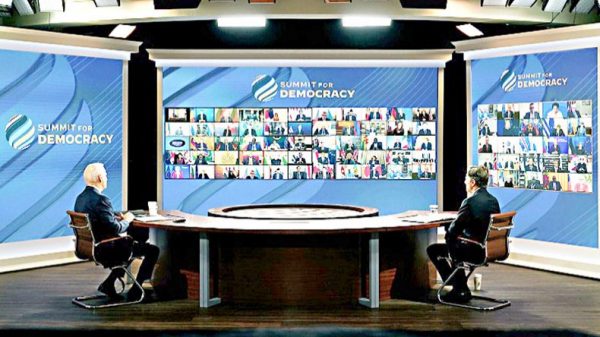Summit for Democracy

- Update Time : Monday, December 20, 2021
- 229 Time View

THE so-called Summit for Democracy held in December 9-10 by the Biden administration online is worth noting mainly because it reflects internal and external problems of the organiser of this event, ie, the United States. Of the latter problems, today’s main one is Washington’s assessment of China’s emergence as a new global power threat to national interests.
This factor acted as the primary motivation for holding the summit, even though Beijing was not directly mentioned in the speeches of the American president. But, of course, it was clear who was implied to be the main culprit behind the process of democratic recession and the growing role of autocracies in the world, which Joe Biden is concerned about.
The Summit for Democracy to which China, the Russian Federation, and some other countries, including some US allies, were not invited was designated a turning point. Apparently, one should expect a change in the recession of democracy to the expansion of its significance in the world.
As for the question of definitions, particularly relevant for such a category as democracy, the host of the event confined himself to saying of the countries where people are allowed to breathe freely and their governments do not try to strangle them with tyranny. In this connection, it would be interesting to know how the people who built the US ‘breathe’ today in the face of terror against them from university-educated left-wing groups, which have the full support of the state apparatus.
Generally speaking, Joe Biden is doing the right thing, not being bothered with the aforementioned issue. In the course of the propaganda war, which was the very act of the event under discussion, any detailed consideration of such an issue, and even with the help of concrete examples, can lead to highly undesirable results.
Today, the ‘democracy’ is nothing more than a political marker for those who often use it. By analogy with the primitive Hollywood source, it is intended to separate the good guys from the bad guys in the global space of the current stage of the great world game. Therefore, if somebody bothers with any clarifying questions, it will be discovered very quickly and with a high probability that good guys are as bad as they come, but bad guys can still be dealt with.
Meanwhile, similar issues arise in the good guys’ camp. India, which Washington politicians have recently been designating with the well-established meme ‘the Largest Democracy in the World’, expressed perplexity) over the composition of those invited to the Summit for Democracy, as well as the appropriateness of the participation of prime minister Narendra Modi in it. It should also be noted that India has an ever-increasing debate on the consistency of the definition of democracy with the country’s current political practice.
In the main object of the mentioned event, they rated it in advance as an act of information warfare and started preparing for it appropriately. First, the main participants of the forthcoming forum were designated by the term ‘anti-Chinese ideological clique’. Secondly, a series of analytical materials were prepared, which examined both the category of ‘democracy’ and its compliance with the state system, domestic and foreign policy practices of the main geopolitical opponent.
Representatives of the country’s leadership used various venues to express their own views on all related issues connected to the upcoming Washington event. In this regard, a joint article by the Ambassador of Russia and Ambassador of China to the United States published in late November in the National Interest magazine is significant.
On December 9, during the 14th Bali Democracy Forum, Chinese foreign minister Wang Yi spoke (also online), highlighting the same category of ‘democracy’, among other things. According to the Chinese foreign minister, no one has the exclusive right to ‘possess and interpret’ it. One can call a country ‘democratic’ only if the people living there are the masters of their fate. This, of course, is also too general of a definition and needs to be clarified.
On the whole, Wang Yi’s speech was relatively neutral, that is, not confrontational at all. In particular, the speech stated China’s refusal to impose the Chinese state system on anyone and, on the contrary, its readiness to study other countries’ democratic experience.
Once again, by the way, it’s worth noting that this ‘neutrality’ concerning the political arrangement of the partners in the foreign policy arena essentially defines the success of China’s primary global Belt and Road Initiative.
But no political correctness towards the forthcoming Summit for Democracy was shown by the Chinese media commenting on it. As they say, the illustrators of the published articles have had their fun. In particular, stories centred around the Statue of Liberty at were played out. But the illustration on ‘Mirror, mirror, on the wall, who is the fairest of them all?’ seems to be a masterpiece of this genre.
The moderate tone of the Chinese minister’s speech mentioned above is noteworthy, given the defiant nature of both the Summit for Democracy format and the series of other, almost simultaneous, overtly anti-Chinese actions. First of all, the participation of the representative of Taiwan in the work of this forum should be mentioned.
At the same time, the Uyghur genocide has been once again brought up to date. The day before the Summit for Democracy began, a draft piece of legislation condemning the alleged forced labor of Uyghurs on XUAR cotton plantations passed through the House of Representatives of Congress. On December 9, the UK-based Uyghur Tribunal made the final decision.
These accusations served as one of the main reasons for activating the diplomatic boycott of the Winter Olympic Games in Beijing next February. So far, it involves five Anglo-Saxon countries with a different explanation, which once established The Five Eyes intelligence alliance. But obviously, Japan, which until recently claimed to have its own opinion on this issue, wavered as well.
Finally, it seems appropriate to express the author’s opinion about the place in the history of humanity of the last two and a half centuries of the phenomenon called the United States, the organiser of the ambitious Summit for Democracy. Despite all the fair rebukes to this country, it is still a relatively young civilisation. So one of the above illustrations, which plays on the theme of the lady’s age personifying the United States, seems like an artistic exaggeration. The United States is close to what in Russian history is denoted by the pithy word ‘smuta’, which could be loosely translated as riot or troubles (as in ‘time of troubles’). Attempts to transfer its costs abroad rather than work to overcome them appear to largely explain Washington’s current period of hyperactivity in the foreign policy arena.
The fact, format, participation, and focus of the Summit for Democracy that has just taken place attest to that fact. Moreover, the summit is now going to be held regularly.
New Eastern Outlook, December 16. Vladimir Terekhov is an expert on issues of the Asia-Pacific region.



















